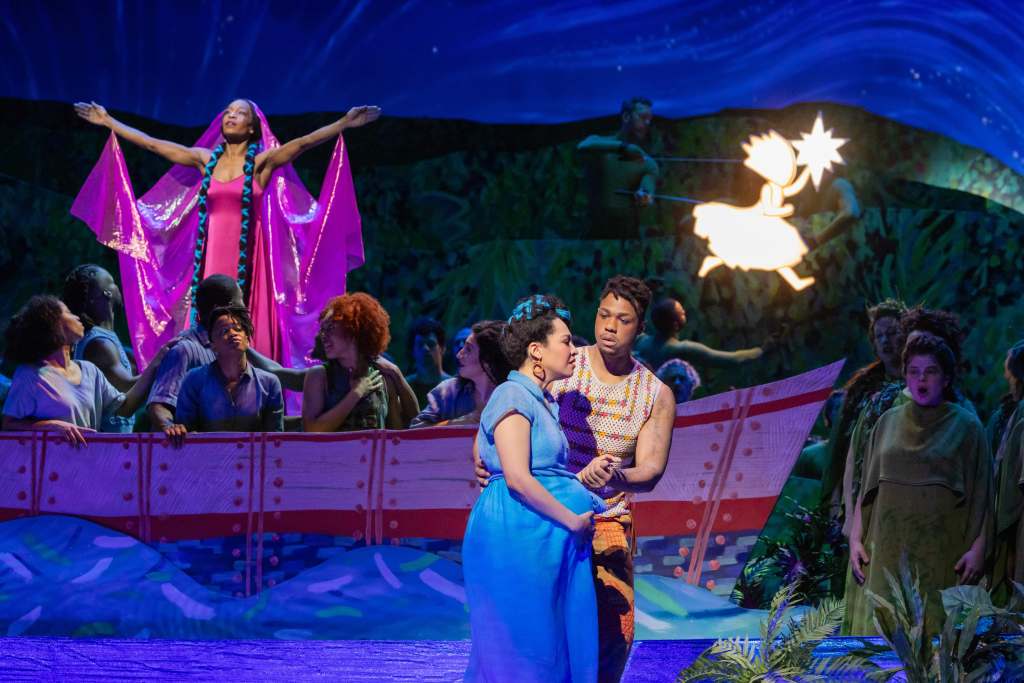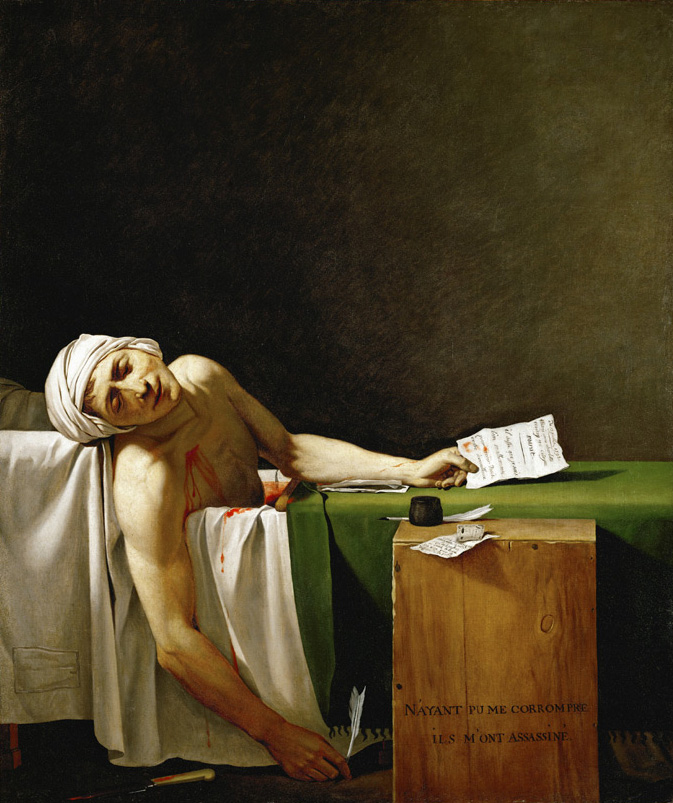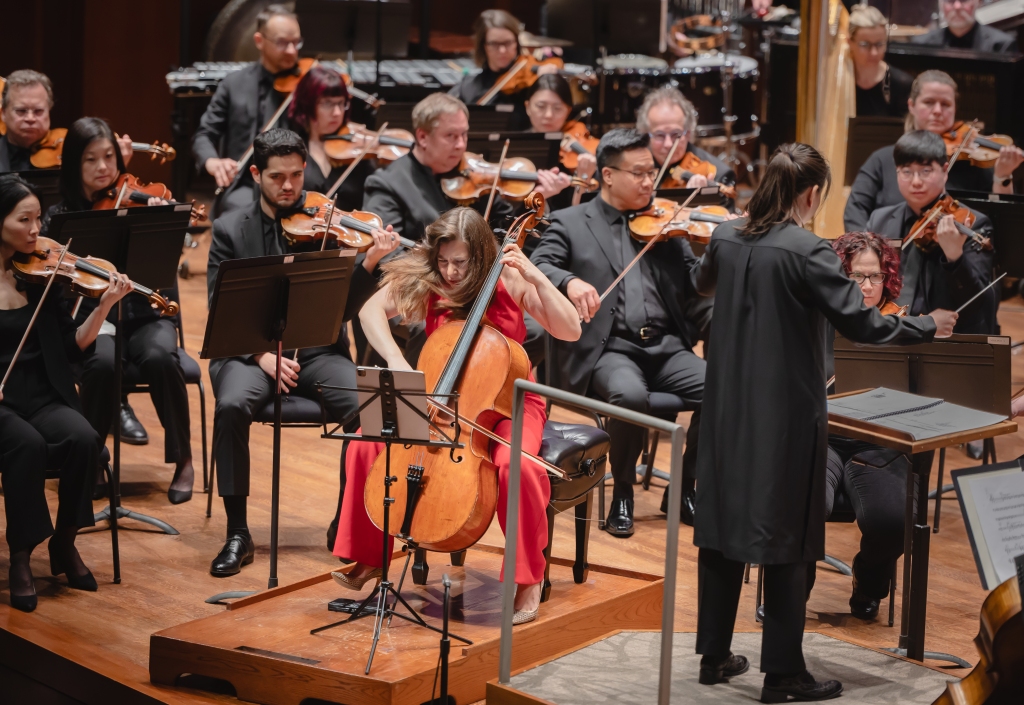
Wrapping up a rich and lively weekend of music in Seattle, Víkingur Ólafsson paid a visit to Benaroya Hall on Sunday afternoon May 4 for a program solely devoted to J.S. Bach’s “Keyboard exercise, consisting of an ARIA with diverse variations for a harpsichord with two manuals” — or, as posterity knows the work, the Goldberg Variations.
Seattle was the latest stop on the Icelandic pianist’s current world tour of the work, which comprises no fewer than 88 concerts, in homage to the number of keys on the modern piano (quite a few more than the 54 keys of Bartolomeo Cristofori’s original “gravicembalo” or the 60-something keys Bach was used to when playing one of his harpsichords).
As Ólafsson explained to the culture journalist Paul Hodgins, the fact that he turned 40 this year inspired him to think up “thinking that I wanted to have a “a different kind of touring season. I thought, ‘What if I do a whole world tour with the Goldberg Variations and challenge myself, hopefully to keep renewing myself and finding … new truth in this work — do 88 variations on these 30 variations and try to try to find something unique each night?’” In reality, demand has been so high that Ólafsson has ended up extending the number up into the 90s.
But once the Seattle audience had settled into place — an impressively large gathering for a solo recital on a Sunday afternoon — and the boyish-looking Ólafsson strolled out onto the lonely stage, it was as if he were confronting his awe at this colossal monument for the first time.
Nothing could have been further removed from the routine or predictable. Even though the basic outlines of his interpretation of the Goldbergs are available from the DG recording he released last October — coming in at about 74 minutes total — he radiated such presence and intensity in this live performance that he gave the impression he had only just arrived at his understanding of the work and its interconnections.
Indeed, it would be fascinating to compile the pianist’s observations throughout his odyssey, following each performance, of what struck him as unique or different in that particular iteration, in that specific exchange with the audience.
At the same time, the signatures of Ólafsson’s style were there, presented with compelling grace and concentration. His first statement of the Aria was like gifting a troubled world with an object of pellucid, crystalline beauty, each note value and ornament having its raison d’être. Throughout, Ólafsson chose subtle rather than flamboyant alterations in the repeats — variations of the variations — that heightened the sense of mindful attention his performance encouraged.
But there was no dearth of drama, signaled already by the leap into Variation 1, following the mood carefully established by his phrasing of the Aria: an abrupt intrusion of velocity that audibly took the breath of some in the audience. As if to say that the peaceful quietus mimicked by the final cadence of the Aria’s return in its first statement was an illusion, now the business of living begins, the whirlwind of experience.
I could single out numerous specific reactions and associations set loose by each station on Ólafsson’s journey — that overused metaphor for music-in-action, virtually impossible to avoid in this case. His way of slowly dialing up the weight of a bass line on its return, the exuberant, life-affirming trills of Variation 14, the shock of the first turn to a full variation in the minor in No. 15, itself dwarfed by the seemingly inextricable situation of tragedy in the Adagio Variation No. 25 — Wanda Landowska’s famous “black pearl” — which, in Ólafsson’s hands, fell just short of ten minutes by the clock but seemed an eternity of wandering in a labyrinth of grief.
I’m well aware of the critiques of Ólafsson — not a few of which seem to make a great deal out of the non-musical topic of the photo essay accompanying the DG recording, with its mannered poses and hand displays waiting for a contemporary Rodin to sculpt. It’s no surprise that Bach’s 1741 masterpiece provokes such intense and contradictory responses and defenses. This is a work that reminds us of what is really at stake when music matters.
For my part, I failed to see Ólafsson’s choices as a display of self-indulgence or arbitrary exaggeration. Instead, I was won over by his ability to encompass so many shades of emotion and states of being while deploying the most extraordinary technique. I relished his deeply songful legato lines and transformation of toccata display into unfettered joy. With his magician-like hand-crossing and suspended right-hand gestures, the visual dimension also fascinated. My only question, not even necessarily a quibble, was the degree to which Ólafsson seemed to rely on the pedal for his legato bliss and tonal mixings.
The Quodlibet was vigorous and hearty, but instead of leading to the moment of final reassurance, the Aria’s return came shrouded in melancholy or even a touch of disbelief — is this all our experience amounts to? Unlike Marx’s notion of recurrence a second time as “farce,” Ólafsson’s has spoken of the Aria’s comeback as a tragic moment: “And that’s what (we feel) collectively when we have that moment together. The aria comes back, and then we lose it again. It’s one of the most tragic moments in music. Not because the music sounds so tragic, but because we feel our own impending death. It is going on without us.”

Yet there is optimism in the endurance of Bach’s own work, which the Thomas Cantor described as “composed for connoisseurs, for the refreshment of their spirits.” Ólafsson, in his essay accompanying the album, resorts to the metaphor of “a grand oak tree, no less magnificent, but somehow organic, living and vibrant, its forms both responsive and regenerative, its leaves constantly unfurling to produce musical oxygen for its admirers through some metaphysical, time-bending photosynthesis.”
At the end of it all, Ólafsson acknowledged the several rounds of applause with self-effacing sincerity, pointing gratefully to the Steinway. With no apparent depletion of the energy with which he had first beelined his way there an hour and a quarter before, he explained why an encore simply wasn’t in the works (though I’ve seen reports of an occasional encore offered in other venues on this tour): “There’s already an encore built into the Goldbergs, with the repeat of the Aria. And if I played that again, I’d have to continue with the first variation, and the second, and … We’d still be here for awhile….”
Ólafsson also mentioned how happy he was to be in Seattle, since it have him a chance to reunite with a former classmate at Juilliard who had been a source of inspiration: Seattle Symphony concertmaster Noah Geller.
A couple days before, on Friday evening (May 2), Geller had been in the spotlight as the curator and featured artist of the SSO program Noah Geller’s Playlist — the last in a new series this season that has also featured such artists as Mahani Teave and Conrad Tao.

Played without intermission and with SSO reduced to a chamber size ensemble, the concert was filled with delights from start to finish — and offered yet more music of Bach. Geller was joined by principal second violinist Elisa Barston as co-soloist in Bach’s Double Violin Concerto in D minor, BWV 1043 — which Geller characterized as “the happiest that D minor has ever been made to sound.” The highlight of their account was the lyrically urgent Largo (in F major), while the fast outer movements flowed with overlapping waves of energy.
If Bach creates the illusion of a unified mega-instrument from the two soloists — Geller and Barston playing off each other with stylishly expressive flourishes — the great sonatas and partitas fashion a mirage of plurality from the solo instrument. Geller later played as an encore a heartfelt, deeply touching account of the Andante from Bach’s Sonata No. 2 in A minor for solo violin.
It followed his marvelously satisfying interpretation of the last and most-popular of Mozart’s canonical violin concertos, K. 219 in A major. SSO assistant conductor Sunny Xia elegantly guided the sonic balance. Geller seemed to be revisiting the hallucination of an idyll that had been imagined by his first, quasi-“slow motion” appearance in the opening movement, free this time to ponder its meaning at ecstatic length and singing high above the ensemble voices with sweet but never syrupy tone. He showed swashbuckling virtuosity in particular in the speedy section of the curiously constructed Rondeau finale. The entire piece emanated personality and multifaceted charm.

Between the two repertoire items, Geller selected a new piece by the composer Samuel Carl Adams. Hailing from Berkeley (where his famous father, John Adams, resides), Adams is of late a locally based artist, having moved to Seattle with wife Helen Kim, SSO associate concertmaster. Composed in 2018, Movements (for us and them) is composed for string orchestra with a concertino string quartet (Geller did not perform here).
It was an inspired choice, juxtaposing the shifting textural currents of Bach’s concerto grosso format and Mozart’s solo concerto plot with a richly reimagined drama of single and collective voices. A composer whose textural innovations are matched by a solid understanding of architecture and long-range form, Adams found inspiration in the Italian writer and journalist Italo Calvino’s Six Memos for the New Millennium (planned as part of the Charles Eliot Norton Lectures at Harvard). Movements pulsates with exciting rhythmic layering and polyphonic bounty, reflecting the composer’s desire to explore “cooperation and fluidity” in musical terms.
(c)2024 Thomas May All rights reserved





